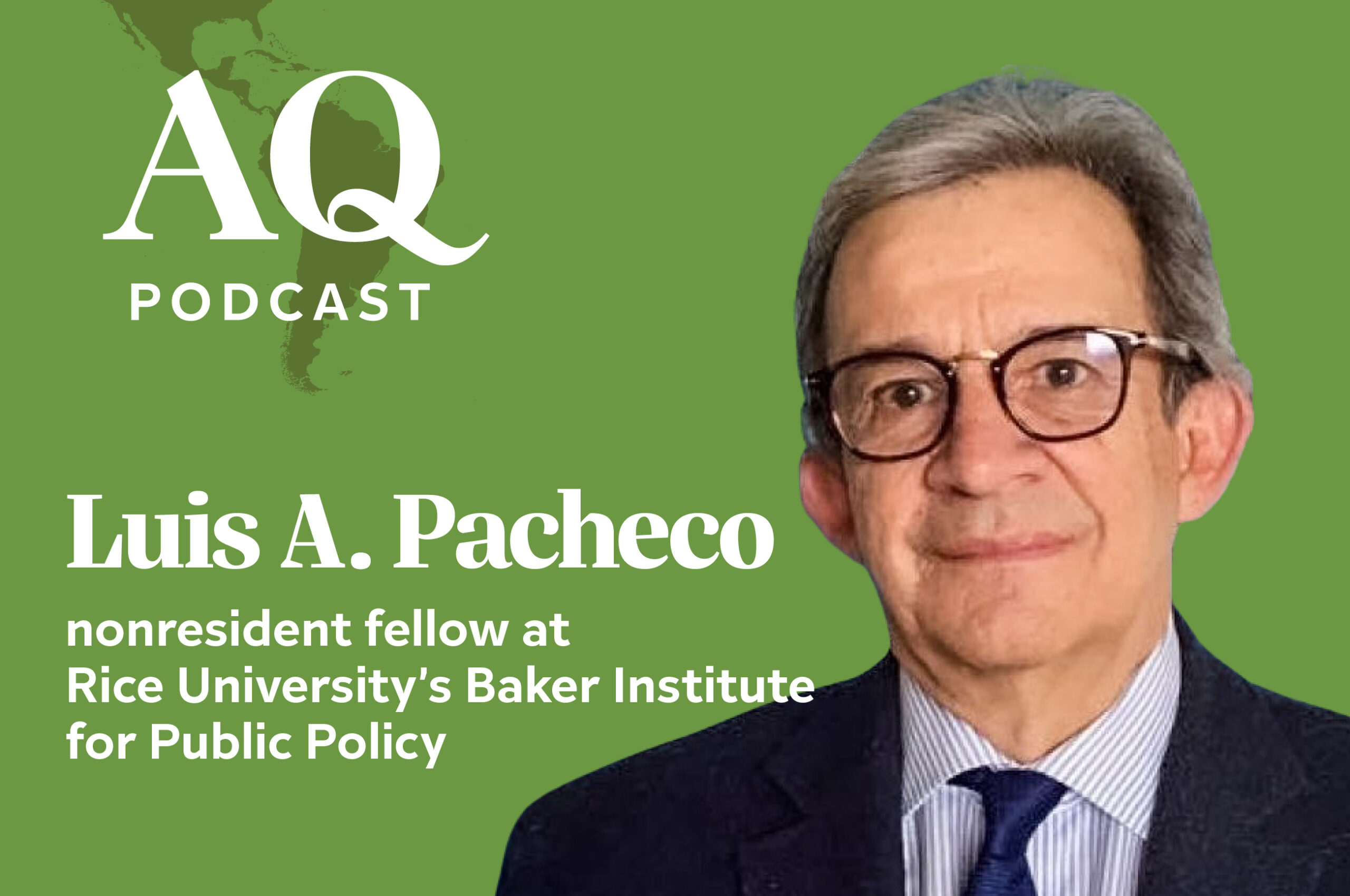Interview: U.S. Representative Matt Salmon on Opportunities for U.S. Policy in Latin America
Interview: U.S. Representative Matt Salmon on Opportunities for U.S. Policy in Latin America
The chairman of the House Subcommittee on the Western Hemisphere shared his views on topics ranging from U.S.-Mexico border challenges to the future of energy security in the Americas.
“[The TPP] is one of the most exciting things, not just in the region, but in the entire world when it comes to trade opportunities.”
Council of the Americas’ Kezia McKeague sat down with U.S. Representative Matt Salmon (R-AZ) for an exclusive interview about his priorities as chairman of the House Subcommittee on the Western Hemisphere, a position he assumed in January 2013 at the start of the 113th Congress. Salmon shared his views on topics ranging from U.S.-Mexico border challenges to the future of energy security in the Western Hemisphere.
AS/COA: As a Mandarin speaker with experience living in China, what sparked your interest in the Western Hemisphere?
Representative Matt Salmon: Number one, Arizona is a border state with Mexico. Mexico is our number one trading partner and Canada is our number two trading partner, both within the Western Hemisphere.
Also, two of my children went to South America for missions for our church. One went to Ecuador and the other went to Brazil. Then my son-in-law did a mission for our church in Peru. My nephew went to Colombia. And so it just sparked a lot of interest for me in hearing their stories.
My nephew was in Colombia when they were working hard with the United States to try to overcome some of the drug problems. I think 10 or 12 years ago none of us ever in our wildest dreams would have ever speculated that the Colombia of then would be the Colombia of now.
The more I read on what’s happening with other countries in the region—Peru and Chile and the tremendous economic progress that they’re having—it just led me to believe that because of the nexus with Arizona, the growing economic and trade opportunities in Latin America, and the fact that they’re our neighbors, we need to develop better relationships with them. And because I got my seniority back, I was able to ask for which committee I wanted.
AS/COA: What would you describe as your priorities as chairman of the subcommittee?
Salmon: I think my priority is win-win, that anytime we try to craft policies that are just beneficial to the United States, they’re not going to fly. They have to be win-win proposals. So my goal is to develop win-win proposals and agreements on trade policy. I’m a very strong advocate of TPP [the Trans-Pacific Partnership]. I think it’s one of the most exciting things, not just in the region, but in the entire world when it comes to trade opportunities.
I’m very excited about the opportunity to have an energy-independent Western Hemisphere. I think that if Mexico is successful in reforming some of its energy laws, as the president wants to do later this year, and Brazil is able to open up a little bit on some of their energy policies and get rid of the more state-owned enterprise concept that they have right now, I think there are going to be phenomenal energy opportunities for the United States. That’s why I really pushed the bilateral Transboundary Hydrocarbons Agreement with Mexico, because I believe that that is a phenomenal opportunity and I think it jumpstarts and strengthens President [Enrique] Peña Nieto’s hand as he tries to negotiate reforms with his Congress and his people. I am very, very excited about cooperative security measures between us and our friends.
I think the other thing that’s a priority for me is building stronger alliances with our friends and trying to collectively head off some of the mistakes that have happened. Collectively, we need to work together to instill free-market and free-enterprise solutions, and I think that some of our friends are a lot better messengers than we are, using Colombia and Mexico.
I also think that working with Mexico on the Mérida Initiative is a great thing. I think we’ve accomplished good things and we’ve proven that when the United States sets its mind to it and works with a motivated country like Colombia, the same thing can be accomplished in Mexico. I’d like to see Colombia maybe play a bigger role in helping us to work with Mexico to show what the successes were. I think there are a lot of parallels there.
AS/COA: The title of your first hearing as Subcommittee Chairman was “Overview of U.S. Interests in the Western Hemisphere: Opportunities and Challenges.” What are the primary opportunities and challenges? What in your opinion represents the greatest challenge to U.S. interests in the hemisphere?
Salmon: As I mentioned, the greatest challenge is with some of the countries that I think are moving in the wrong direction like Venezuela, Bolivia, Ecuador, and Argentina. Argentina has vast resources and tremendous opportunity. But they’re mismanaging those resources.
I’m very concerned about Venezuela and the fact that they seem to be going from bad to worse as far as their economy is concerned because of the major mismanagement of their resources. I think concerns there about them wiping out freedom of the press will hurt them. In Venezuela, the economy is about to implode, and it’s because of their lack of regard and respect for business and the way business operates in a free market. [President Nicolás] Maduro made an out-and-out promise right after the election that he would audit the results, and we’re still waiting.
So I think that the United States and guys like me can talk until we’re blue in the face, but if we can get our friends, like [President Juan Manuel] Santos in Colombia, or some of our surrogates or others who can speak with us.
AS/COA: Turning to the theme of opportunities, you also held two hearings focused on energy security. Given that the Western Hemisphere is blessed with ample energy resources, how should the United States become more engaged in regional energy issues? How do you think the United States can play a role in advancing the development of renewable energy and cross-border energy trade with Canada and Mexico?
Salmon: First of all, I think that this administration needs to approve the XL pipeline tomorrow. The Canadians are beginning to not lose interest, but lose respect. It’s been three years now. Virtually every report that’s ever been done on the greenhouse gas emissions, damage to the environment, and its impact on global warming has shown that it’s negligible to nothing. And yet the president keeps stalling. And it’s time for us to get this done.
On another front, that’s why we pushed so hard on the Transboundary Hydrocarbons Agreement, and it did pass the House. I know there is a little bit of a sticking point right now on the waiving the Dodd-Frank’s rules from the bill, but it’s a minor sticking point. We can iron it out.
There are oil opportunities in Colombia, in Argentina, and obviously in Venezuela, and those are things that we need to keep working on. I mentioned the pre-salt region in Brazil, which I’m very interested in. Now, this isn’t energy but I’m also very excited and would like to help lead the charge on a bilateral FTA with Brazil, even if it’s just on financial services, but something to kind of get the ball rolling with Brazil and the United States. I think we need to take that next step forward. But one last thing is something we have to export in the United States, and that’s compressed natural gas.
There are tremendous opportunities, especially within the Caribbean, for us to export our natural gas. We need to do it. We’re going to need more cooperation at the Department of Energy in this country to issue the permits, because that to me is a win-win again. The people in the Caribbean are going to be able to get cheap natural gas and we’re going to be able to sell it.
AS/COA: I’d like to conclude just with a question related to Arizona’s neighbor and top trading partner, Mexico. As a representative from a border state, how do you view the debate over border security? Do you think more emphasis should be placed on facilitating greater commercial opportunities and addressing infrastructure needs at the border?
Salmon: Absolutely. I think that the ports of entry are clogged and as they stand right now they’re an impediment to meaningful trade between the countries, and I think that we ought to be doing everything we can to try to enhance those stations and make sure that we have adequate personnel to make the flow seamless.
On immigration in general, I think that when it comes to doing business in the United States, or studying abroad in the United States from other countries, it ought to be as simple as it possibly can. I think that process needs to be simplified. Overall, the border issues are extremely important as we deal with trade issues as well.
AS/COA: Is there anything else you’d like to add about the hemispheric trade agenda?
Salmon: I’m very, very committed to the TPP. I’d like to move on it as quickly as possible. I think that promises incredible benefits to all countries involved, but especially to the United States. It’s a very good trade agreement and I want to do everything I can to try to further it as quickly as we can.
With respect to Mexico, I think there are phenomenal opportunities there. Mexico’s economy is growing almost double what the United States’ rate of growth is. I think a lot of those problems will be solved if the United States is a lot more diligent in working in a mutually beneficial way with Mexico to strengthen their economy and help strengthen their rule of law and their judicial system; to do everything that we can and then eradicate the drug lords and the threat of violence that currently pervades Mexico. I think we’ve got to do everything we can on all those fronts. If we do that and Mexico becomes what I believe it can be, an economic heavyweight, a lot of these arguments that we’re having over border security are going to go away. There are two main reasons why people have been leaving Mexico: one, economic security or opportunity, and the other is personal security and fear of cartel activity. If we can help Mexico on both those fronts, those issues go away.








